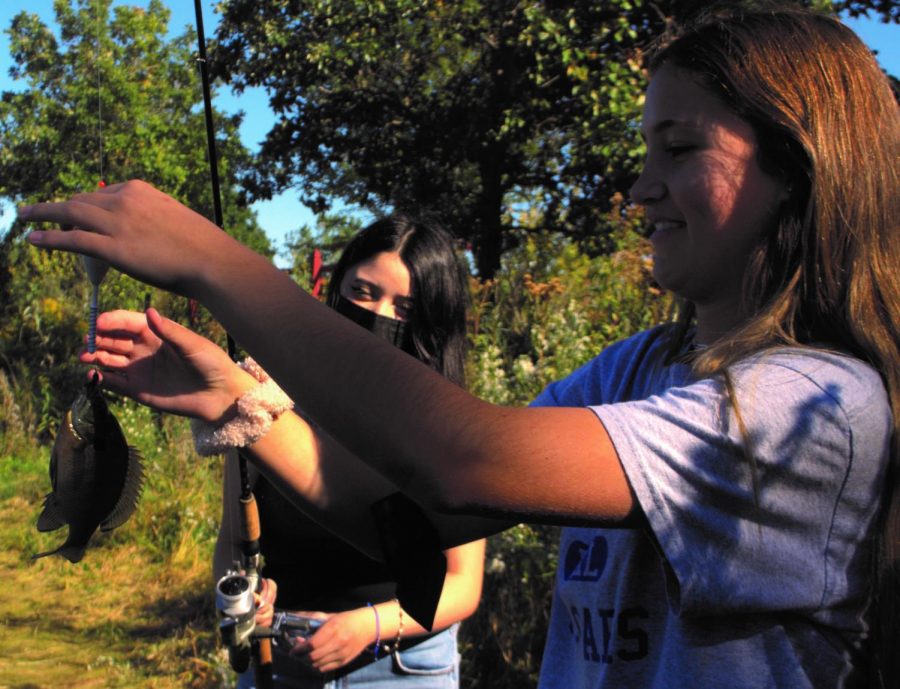Early bird gym: No exemption from exhaustion
Haley Kalinowski (10) learns skills like fishing during Outdoor Ed, which goes beyond the typical P.E. curriculum.
Your limbs are heavy, feeling like bricks as you lift one slowly to climb the seemingly never-ending stairs. As you reach the top and enter your messy room, still feeling the disastrous rush of that morning, you collapse on your bed.
At this moment, you block out the pile of homework waiting for you, almost tauntingly, and push out the stress of losing your soccer game. Your mind floods with worry with only one thing: tomorrow’s workout for early-bird gym.
For these exhausted students, one hot topic comes up in the hallways: why is early bird gym not allowed to be exempted by athletes?
Kaitlyn Cherwenka (10), though not in early-bird gym, expressed her ideas about the no exemption rule for athletes and the disadvantages those students have from her experience of having a study hall during her physical welfare period.
“[Students who are exempt from regular gym] do have more of an advantage,” Cherwenka said. “They have more time to do their homework versus when you’re doing a sport and have gym.”
Doing two workouts a day plus the mental workout of schoolwork takes a toll on people who participate in school sports.
Moreover, one main problem that athletes in early-bird are facing is the reality of burnout and exhaustion.
According to a poll of 132 students run by The Scratching Post, 83.3% of students who take an early bird gym class and participate in sports strongly agreed that they should have the ability to be exempt.
When the regular eight-period day changes to nine periods, it isn’t hard to imagine students’ struggle, especially
considering many students do not even have an entire lunch period.
Ninety-four and a half percent of these students who take early bird gym and participate in sports expressed that their energy levels were between very tired and tired after they returned from school.
This is significantly higher than those who do not take early bird gym, of which 68.5% reported being tired to very tired after a school day.
Caleb Gumminger (9), an honors student, talked about how he comes home very fatigued after a long school day, still
having work to do.
“I’ve had times where I’ve just been so tired,” Gumminger stated, “I do not want to do more. But I have to do [homework] anyway.”
From this information, it is clear that exhaustion is plaguing VHHS students. This means we need to find a solution and understand why this is happening.
On top of that, 90.2% of students expressed that they only took an early-bird gym class to fit in another class. This is
the ever-present problem: Why is there so much pressure to pack one’s schedule with demanding courses?
Michael McCaulou, the department supervisor of physical welfare, was woeful about people taking early-bird gym only to fit in another class to boost their GPA.
“The reason they’re doing it is to get another AP class or another honors class. And that is their choice,” McCaulou said. “But, I have also heard a lot of stories from students verbatim that it was probably the wrong choice, and they just took on too much.”
McCaulou knows students face burnout, and from the recent data points collected from the survey, it is clear that exhaustion is recurrent.
However, at the same time, society is pushing kids to take the most challenging classes. Throughout the school, students can be heard discussing grades, arguing about who has more homework, and who
went to bed the latest the night before.
With this, McCaulou said that physical education classes give you more than just workouts; they give you healthy habits to take with you throughout your life.
“A lot of us know that we’re teaching more than just the physical health,” McCaulou said, “The mental side of it with the SEL (social emotional learning) components…..talking about anatomy and physiology and the whys in eating healthy and nutrition, talking about that and how all of that makes you healthy and fit.”
The notion that gym is more than just exercise is present in some classes in VHHS. For example, Outdoor Education,
another physical welfare class, participates in fishing, rock climbing, and other activities outside the regular workout.
Therefore, physical welfare classes do give more than what meets the eye, with helpful lifestyle habits and skills. Yet, isn’t there a better way to teach students lifestyle skills without athletes being exhausted with workouts from the
early-bird gym?
VHHS is a learning place for students. The staff focus on teaching healthy habits to succeed in life despite mental challenges.
Nevertheless, we as a society are known for praising burnout. We do things like equating work ethic to the amount of time put forth with the most strenuous effort. We equate busyness with productivity, causing this pressure to fit so much into a student’s schedule to a point where the amount of credit a class is worth trumps students’ interest in the class.
Allowing early-bird gym exemptions can help control the physical aspect of this problem. We need to face the fact that this praise of burnout leads kids and adults down a dangerous road.
Changing mindsets to the phrase “work smarter, not harder” will be difficult. To further health in students, we need to start sending the message that exhaustion is not success.

